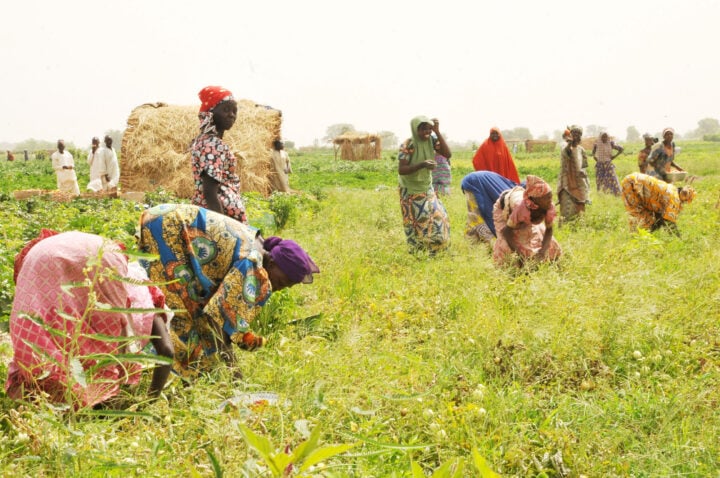Last week, while attending the virtual summit of the African Green Revolution Forum (AGRF), I listened to delegates and stakeholders explore innovative ways to streamline Africa’s agricultural value chains to be able to “feed the cities and grow the continent.” During the four-day summit co-hosted by the Rwandan government, AGRF partners, representatives of various countries and organisations also spoke on proffered solutions on exploiting the growing urban food markets as a “launchpad” for growing Africa’s agricultural investments into stable businesses while also meeting the continent’s growing demand for food.
As the discourse was ongoing, back in Nigeria, President Muhammadu Buhari was also making a case for the same cause although with a wrong premise. During a meeting of the National Food Security Council in Abuja, Buhari had directed the Central Bank of Nigeria (CBN) not to provide forex for the importation of food items and fertilizer as a measure to among other things encourage “able-bodied” youth to farm.
“We have a lot of able-bodied young people willing to work and agriculture is the answer. We have a lot to do to support our farmers,” the president’s spokesman quoted him to have said.
With the agricultural sector accounting for 26.09% of Nigeria’s gross domestic product (GDP) in the fourth quarter of 2019, agriculture remains one of the viable options for Nigeria to diversify. But what is perhaps the irony of the president’s message is that he was not talking about mechanised farming, rather suffer-head agriculture, hence the need to be able-bodied.
Advertisement
Who will tell the president, who himself is a farmer, that the world has gone past beyond manual labour in agriculture to mechanised and precision farming? Interestingly, this was one of the key messages at the AGRF summit this year.
Despite having arable land, statistics show Nigeria is said to be one of the least mechanised farming countries in the world, with the country’s tractor density put at 0.27 hp/ hectare, far below the Food and Agriculture Organisation (FAO)-recommended ratio of 1.5hp/hectare for Africa and other developing countries.
At various stages of the AGRF summit, speakers and panelists spoke of how digital agricultural solutions such as precision agriculture, data aggregation and analysis, satellite imaging, robotics, and automation can help in not just boosting productivity and income but also in driving entrepreneurship and reducing the environmental footprint of agriculture.
Advertisement
The AGRF notes that in 2019, the adoption of digital agricultural solutions for farmers in Africa improved their incomes by 20-40 percent while the use of digital advisory services led on average to a 20% improvement in yield. Digital financial and market linkage services also resulted in general improvements of 40 percent and 70 percent respectively.
As rightly stated by Liam Condon, president of Bayer Crop Science and a panellist at one of the summit’s sessions, the possibilities for digitisation for African farmers are “endless … thanks to monitoring, drones, remote sensors and AI, data is everywhere.”
Concerns about costs and access for farmers in rural areas among other challenges are also valid. So, how do you expect a rice farmer in Kebbi state, for instance, to afford these solutions when they are operating in a country with the highest poverty rate globally?
To address this, Denis Kyetere, Executive Director at African Agricultural Technology Foundation (AATF), said an enabling environment from the government is critical, in addition to “clear business models to encourage the private sector to invest.”
Advertisement
Away from digitised and precision farming, another highlight from the AGRF summit which drew more than 10,000 delegates, was discussions that centred on defining food systems to reduce poverty and improve food security and nutrition across Africa.
At the AGRF presidential session, Karina Gould, Canada’s minister of international development, urged for a cross-sectoral food system approach that would “break down sectoral silos and take an integrated approach to food systems” while Josefa Sacko, AU commissioner for rural economy and agriculture, spoke of the need for huge investments in the agricultural sector as one of the fastest ways to end hunger.
For a sector that has the potential to grow into a $1 trillion industry in the next 15 years, from the current status of $3 billion, thanks to urbanisation and population growth, speakers spoke of how Africa’s agribusiness sector could benefit from various investment opportunities to be able to feed the continent.
According to Olegário dos Anjos Banze, Mozambique’s vice-minister for agriculture & rural development, “we need investments in everything that touches on agriculture. We must realize that without good roads, seeds and animal breeds, it is hard to lower the cost of production and compete with other countries in the export market.”
Advertisement
With the summit theme as, Feed the cities, grow the continent: Leveraging urban food markets to achieve sustainable food systems in Africa, the organisers said in a statement issued at the end of the event that there is a great need to rethink Africa’s food systems “in order to deliver a more resilient, better nourished, and more prosperous outcome for all.”
Some of the other highlights also included the launch of the 2020 Africa agricultural status report which assessed the opportunities, challenges and policies required to enable African farmers and agribusinesses serve the rapidly growing urban food markets, the agribusiness deal room which yielded to over 1,000 investment and partnership meetings as well as the presentation of the 2020 Africa Food Prize to Catherine Nakalembe and André Bationo, from Uganda and Burkina Faso respectively, “for their exceptional contribution towards the promotion of food security across the continent.”
Advertisement







